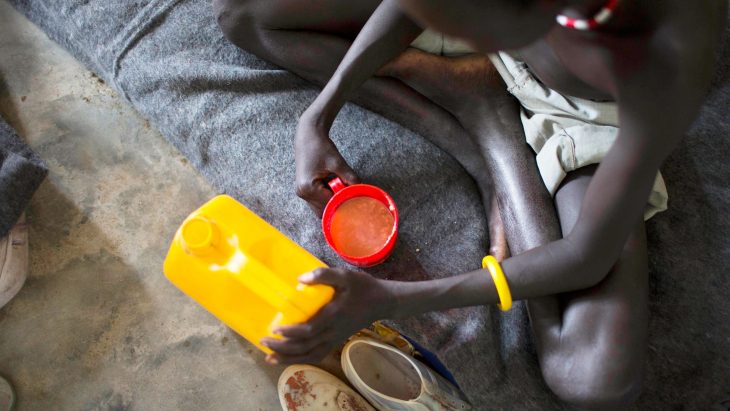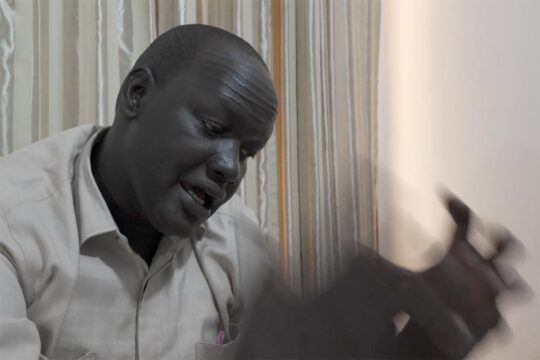Context: South Sudan gained independence from Sudan in 2011 after a bloody, decades-long struggle against the North, often complicated by in-fighting amongst rival southern factions. After independence, former rivals formed a national government. Despite hopes for a better future, political tensions in the newly independent South Sudan erupted into civil war at the end of 2013. The war quickly took on an ethnic as well as political dimension, with civilians often targeted. Thousands have died and more than a million have been displaced, according to the UN (out of a population of some 11 million). The Global Centre for the Responsibility to Protect, a genocide watchdog group, reported in mid-December 2014 that the humanitarian crisis in South Sudan was expected to deepen in 2015, with neighboring countries (notably Ethiopia, Uganda and Kenya but also Sudan) preparing to receive thousands more refugees.
With divisions in the ruling Sudan People’s Liberation Movement (SPLM) party already smoldering (internal struggle for its leadership, notably between the President and Vice-President) , the current conflict began when the country’s inaugural president and longtime leader in the fight for independence, Salva Kiir, accused his vice president Riek Machar of an attempted coup. Fighting erupted between armed members of the two men’s respective ethnic groups, the Dinka and the Nuer. Over the past year, members of the country’s national army and rebel groups of both ethnicities have targeted civilians for killings, have looted villages, obstructed humanitarian operations, recruited children to fight, and committed acts of sexual violence against women. Rights groups have documented several massacres in which men, women, and children were shot in their homes, in churches, and in hospitals. According to Amnesty International, one million people are displaced inside the country and 400,000 have fled to neighboring countries. Many internally displaced people shelter at UN bases, where they are still at risk of sexual violence and other attacks.
Peace talks between the warring sides have been ongoing intermittently in Addis Ababa since January 2014, under the auspices of the regional body Intergovernmental Authority on Development (IGAD), but have so far failed to bring a lasting end to the conflict, despite several ceasefire agreements. A possible sign of hope was the conclusion of an agreement at parallel talks in Arusha, Tanzania, in January between three rival factions of the SPLM to set aside their differences and reunify. Those who signed include a faction loyal to President Kiir, another that calls itself the SPLM-in-Opposition and which is led by former vice president Machar, and a third made up of party officials who were detained when the conflict began in December 2013.
The agreement acknowledged that the rift in the SPLM was "among the root causes" of the conflict, and that party leaders have "contributed to the emergence of the current crisis". The signatories vowed once again to comply with the cessation of hostilities agreement, and to make a "public apology to the people of South Sudan for what has happened since December 15, 2013". They also agreed to "combat the culture of tribalism, militarism and sectarianism". Although the agreement was hailed as a breakthrough, President Kiir has already claimed that parts of the agreement were amended before it was signed (those relating to reinstatement of ministers including Machar who were sacked when the crisis broke).
In Search of Transitional Justice
South Sudanese civil society and IGAD have proposed several transitional justice avenues to hold political leaders and soldiers accountable for crimes, including killings and massive corruption. In addition to urging South Sudan to sign on to the Rome Statute of the International Criminal Court, civil society activists such as David Deng of the South Sudan Law Society have called for a reconciliation and healing commission to help restore communities’ trust in their leaders, and a truth commission to document human rights violations. The Arusha agreement of January 2015 between rival factions of the SPLM (see above under “Context”) includes a commitment to “develop and implement a comprehensive programme for national unity, peace, reconciliation, healing and to promote harmony amongst the people of South Sudan”. A Truth and Reconciliation Commission was already on the cards before the outbreak of the latest conflict. Ironically, the person in charge of steering the process was former vice-president, now rebel leader Riek Machar.
A hybrid court has also been proposed in international policy circles, including by Human Rights Watch. This court would investigate and prosecute crimes committed since the beginning of the current conflict in December 2013.
However, no form of transitional justice has yet been agreed, and insecurity continues on the ground.
The country’s judicial system has been weakened by years of war, and the government has so far refused to cooperate with inquiries by outside organizations such as the African Union. According to Human Rights Watch, South Sudanese law does not explicitly prohibit war crimes or crimes against humanity, terms which many experts have used to describe acts committed by the country’s army and rebel groups. South Sudan has not yet signed up to the International Criminal Court.







